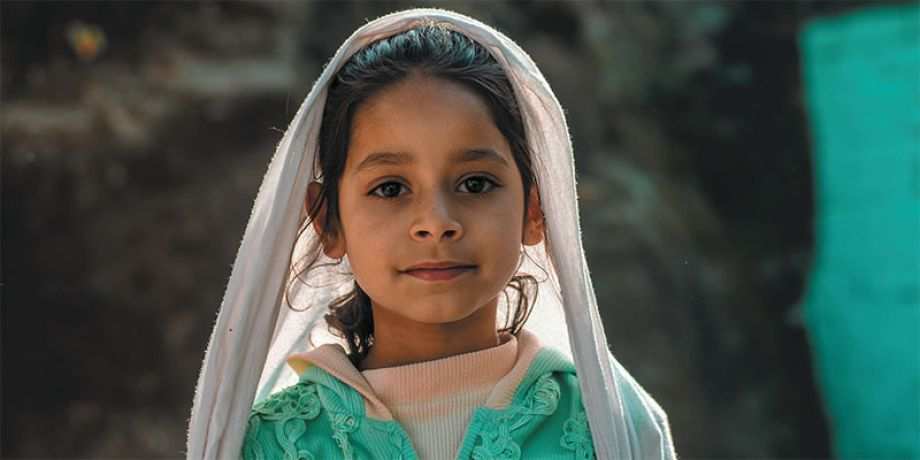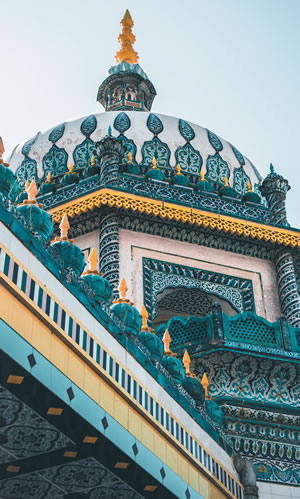
Pope Francis’ pastoral visit to Iraq in the midst of the coronavirus pandemic as a Pilgrim Penitent and as a Pilgrim of Peace put me thinking. Age and diminishing health did not stop him from taking on this pilgrimage which started in the ruins of Ur, the 5,000-year-old Mesopotamian city that was the birthplace of Abraham; the place he once called “home.” That to me was ingenious as it is the root and “home” of our monotheistic religions: Judaism, Christianity and Islam, which on many occasions do not see eye to eye.
 Just as Abraham left Ur and pitched his tent along the way, we Columban Sisters pitched our tent in the midst of Muslims in Pakistan 31 years ago, making dialogue our way of life. In Pakistan we breathe Islam day and night as we hear the Call to Prayer five times each day, wake up to the sirens calling the nation to get up at 3:30 a.m. as it is Ramadan and time to get ready for the fast, and where the presence of God is tangible in the midst of many differences.
Just as Abraham left Ur and pitched his tent along the way, we Columban Sisters pitched our tent in the midst of Muslims in Pakistan 31 years ago, making dialogue our way of life. In Pakistan we breathe Islam day and night as we hear the Call to Prayer five times each day, wake up to the sirens calling the nation to get up at 3:30 a.m. as it is Ramadan and time to get ready for the fast, and where the presence of God is tangible in the midst of many differences.
Our plan to live among Muslims was frowned on because of fear for our security but keeping the vision of dialogue alive and focused gave us strength to face the many challenges over the years. Twentynine years ago, we branched out to the tribal Christians of the Hindu background in the interior of Sindh. This brought another rich dimension to our dialogues which now included Hinduism as well as Islam. This enriched our mission immensely.
Our first Christmas in Pakistan was memorable as our Muslim neighbors gave us our first Christmas tree with a “Happy Christmas” decoration, which they stuck up on the wall. It is important to note that this was a time of great political tension and turmoil in the area where we lived. They protected us in our vulnerable moments and were always with us in good times and difficult times.
On Christmas Day, family and friends arrived to celebrate with us. It was a eureka moment of welcome and the dialogue of life was opened up for us effortlessly. We attended their marriages and deaths as family, and when tragedy hit them, we were the first called, and we supported them. This relationship continues to this day. Their friends became our friends and this experience showed us how life can be, as a tiny minority in a sea of Isla.
One dream was to have a shelter for women as the plight of women was one of our top priorities when we were missioned to Pakistan. We visited a renowned Muslim lawyer in Karachi seeking advice and there we met a young Muslim lady doing her law internship in his NGO; she was a native of Hyderabad, where we lived. This encounter worked out as a partnership for life to the extent that when the Irish Bishops came to Pakistan with Trocaire, she was introduced as a “Columban Sister” as she is of one mind and one heart with us in our mission to reach out to the people on the margins.
As foreigners, we could not open a shelter, so she became our hands and feet. She successfully opened her shelter and worked at grassroots with women, visiting them in their villages as well as accompanying them to the courts and giving them shelter. It was thanks to our relationship with her and her contacts that we were able to visit the women’s jail for about fifteen years as an ongoing twice-weekly presence, running income-generating generating projects with the women prisoners. Their children stayed with them in prison, and we saw to their education. Our Christian children from outside always visited for Children’s Day and payed and danced with the mothers and their children.
One American Dominican priest who was a missionary here for many years was once asked how many people he converted in Pakistan? His answer was “One. Myself. That’s it!” Our neighbor comes in with a tray of food, just cooked for our Eid (Festival). This has been a pattern all our years here and we in turn do likewise. We meet the women and children on the roof and chat across to each other, but this does not mean that as a minority there are no problems among us in this society. Muslims have stood at our gate in dangerous times of war and controversial cartoons to make sure we were not attacked.
As foreigners we cannot take a prominent role fighting for justice, but we remember Shakeel Patan, a neighbor and an outspoken human rights activist opposed to bonded labor who was killed in a car accident. When his body arrived at his home, we were there for his bewildered children who did not understand anything of what had happened.
Our mission mandate to “go to the margins” would not have happened without a vision of dialogue with other religions as being a way of life. God’s kingdom is alive and well in and through all this and hopefully through our daily intermingling of life together we will continue to care for each other as children of the one God for, “It is in Him that we all live and move and have our being.”
Columban Sr. Rebecca Conlon lives and works in Pakistan.